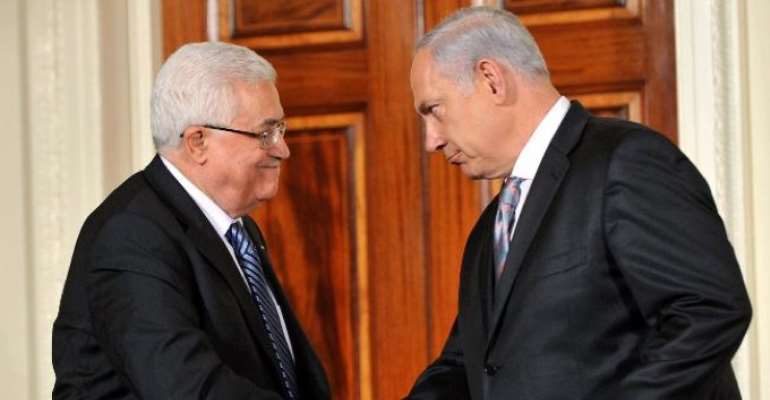MIDDLE-EAST: MAKING FRIENDS OUT OF ENEMIES

An unlikely 3-man band performed in Washington DC the other day. Two of them, the drummers, have since left for home, leaving the trumpeter, President Barack Obama, behind in the White House. It was a good outing that time, with the Israeli Prime Minister, Benjamin Netanyahu, and the Palestinian President, Mahmoud Abbas, agreeing to beat drums of peace, and not war. Now that they are back in the traditional hot spot of the world, Middle East, with an arrangement to sit and hold direct talks regularly, friends appear to be in the making, out of two enemies.
They had looked like twins on TV then, Netanyahu and Abbas, silvery heads, one just a notch taller than the other, as they stood on either side of ‘father of the day’ and peace facilitator, Obama; and Netanyahu had even called Abbas "my partner in peace". These Middle-East neighbours returned to talks after two years of stand off. Issues such as Israel’s settlement construction in occupied West Bank that the Palestinians want as part of their new state, and Israel’s blockade of Gaza, which is controlled by the Hamas movement, had been reasons for the stalemate. Fact is, those issues are also the reasons the current talks had been thought unlikely in some quarters, a thing that had made Abbas reluctant to sit with Netanyahu on this occasion.
President Obama has been largely responsible for the return of Netanyahu and Abbas to the negotiation table. Yes, the American leader has his http://www.guardian.co.uk/world/2010/aug/31/israel-palestine-peace-talks-obamaand because of tough decisions that must be made by the two Parties involved, the initial focus of the Obama administration will be to get the disputants to agree to what can be referred to as a framework agreement. This is about the larger principles that will guide outcomes on issues such as the situation of Jerusalem, Palestinian refugees, border areas, the contentious settlements and so on. It definitely serves the US administration’s short-term needs to get framework agreement first, a matter that is different from the issue of resolving the settlements in general.
While things to do appear neat from Washington’s perspective, this does not apply to the Disputants, and it is in this, obstacles to the progress of the talks lie. During Netanyahu’s first coming as the Prime Minister in the 1990’s, his rightist leaning was a serious issue to negotiations with the Palestinians. He had come across as a hawk talking "security for peace" in direct opposition to the more general view of the international community that Israel must give up "land for peace". Implied in the PM’s position are touches that appear to mean there is no compromise on the major issues of settlement in occupied territories, two-state solution, Jerusalem and so on.
Things hadn’t remained stagnant over the last one decade, but Netanyahu is not looking less than his old self in this second coming to office. Yet, he and Abbas have agreed to meet in Egypt to continue to beat the drums of peace. Reasons for this has alluded to pressure from Washington. It is also suggested that he sees talking with his Palestinian counterpart as a gesture that can serve Israel's goal of advancing its national security, a sort of exchange meant to get America to put pressure on Iran, which nuclear program, the Israelis consider a threat to their national security. But then, Netanyahu is enough of a politician to know that at this stage, it is not politically expedient to stick to the position of neither peace nor war.
Unlike Netanyahu, Abbas’s reason for coming to the negotiation table do not give room for much speculations in spite of his political condition back home. He is convinced that peace process is the only possible road to a Palestinian state. He has been the face of moderates both in the region and among his people, and the Palestinian Authority under his leadership has always advocated peaceful negotiations as the path to secure its people’s national aspirations. With Hamas waiting in the wings, Mr Abbas knows that securing a nation for Palestinians at the negotiation table will garner legitimacy for the Palestinian Authority.
Both Natenyahu and Abbas did return from Washington with a decision to hold direct talks once in two weeks. Yes, both leaders remain far apart over the same issues that have stood in-between them for so long, and neither the Israeli electorates nor Palestinian hardliners appear ready for the necessary but hard compromises. Yet, even doubters of this latest effort point it out that "new elements in the mix could give these talks a better chance of making progress than the half a dozen rounds that came and went before." This may be the best way to access the on-going talks between the Israelis and the Palestinians that President Obama has helped set in motion. The global community should not only give this effort a chance to succeed, but it must back it in any way possible. Israelis and Palestinians that meet and talk ‘path to peace,’ surely, portend better prospects for everyone than a no peace nor war situation that had characterized the relationship between these two peoples whose fates are intricately linked to peace on the face of the earth.
Ajibade, a Consultant Writer, writes through [email protected]
